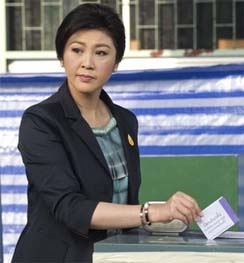
BBC Online :Protests have disrupted Thailand’s general election, halting voting in parts of Bangkok and the south, but officials say that 89% of polling stations operated normally.Some six million registered voters were affected by the closures, the Election Commission said.PM Yingluck Shinawatra called the vote to head off weeks of mass protests.Her party is widely expected to win but legal challenges and a lack of a quorum of MPs may create a political limbo.The unlikely sound of music blaring from a stage led us to the office holding ballot papers for the Din Daeng district. It was also a polling station. Overnight the protest movement had sent dozens of tough-looking men to set up barricades and cut it off.The police did not try to interfere. An officer meekly requested that election officials trapped inside be allowed out. No deal, retorted the self-styled guards, adorned with tattoos and amulets, and some clearly armed. Nearly all were from the southern provinces loyal to protest leader Suthep Thuagsuban.So the police set up a line across the road to prevent a confrontation with angry residents who had come to vote. They waved their identity cards, demanding their right to vote be respected. When that didn’t work, someone brought up a portrait of the king and queen, and they shouted out their loyalty – a riposte to the common accusation by protesters that the government’s supporters are closet republicans.Suddenly one man broke through the police line, shouting “respect my vote”. Insults were thrown back and forth across the barricade, then rocks, and a gunshot, before police could cool badly frayed tempers. They managed to persuade the southerners to pack up and leave; but the damage was done. All voting in Din Daeng was cancelled.Security has been heavy throughout Thailand, with vast areas under a state of emergency.”The situation overall is calm and we haven’t received any reports of violence this morning,” National Security Council chief Paradorn Pattanatabutr told Reuters.Security officials said about 130,000 personnel had been deployed across Thailand on Sunday, including 12,000 in Bangkok.There has been little campaigning for the election and it was unclear how many Thais had turned out.Ms Yingluck, who won the last election in 2011, voted soon after polls opened near her Bangkok home.”Today is an important day,” she said. “I would like to invite Thai people to come out and vote to uphold democracy.”But protest leader Suthep Thaugsuban said the government would be unable to declare a result because of the closures, adding: “Therefore the election is a waste of time and money.”Protests prevented voting from taking place in 438 of Bangkok’s 6,671 polling stations, and there was no voting at all in nine southern provinces.The government said there was no disruption in the north and north-east of the country.Ms Yingluck’s Pheu Thai party has overwhelming support in these regions, while the south and parts of the capital are strongholds of the opposition Democrat Party, which is boycotting the election.But John Sudworth says it is “business as usual” at many polling stations in BangkokThe BBC’s Jonathan Head in Bangkok says demonstrators blocked access to voters at some polling stations in the capital and prevented ballot papers reaching those polling stations.”This is too much. I want to vote,”‘ 42-year-old Yupin Pintong told the Associated Press news agency. “I don’t care if there’s violence. I will be really upset if I don’t get to vote.”Anti-government activist Nipon Kaewsook told Reuters: “We’re not blocking the election. We’re postponing it. We still need an election, but we need reform first.”One high-profile politician, independent candidate and anti-corruption campaigner Chuwit Kamolvisit, brawled with anti-election activists.”They tried to attack me while I was trying to vote,” he said.Ms Yingluck’s opponents took to the streets in November after her government tried to pass an amnesty law that would potentially have allowed her brother, Thaksin, to return from exile.Thaksin, a former prime minister who fled during a court case in 2008, is reviled by the protesters, who say he controls the government from abroad.Disruption to candidate registration means that even if Ms Yingluck wins the election, there will not be enough MPs in parliament for her to have full power over government policy, and by-elections will be needed.The opposition is also likely to mount legal challenges to the election.Ms Yingluck’s party is already facing a host of challenges in the courts aiming to disband it, as has happened with pro-Thaksin parties in the past.

